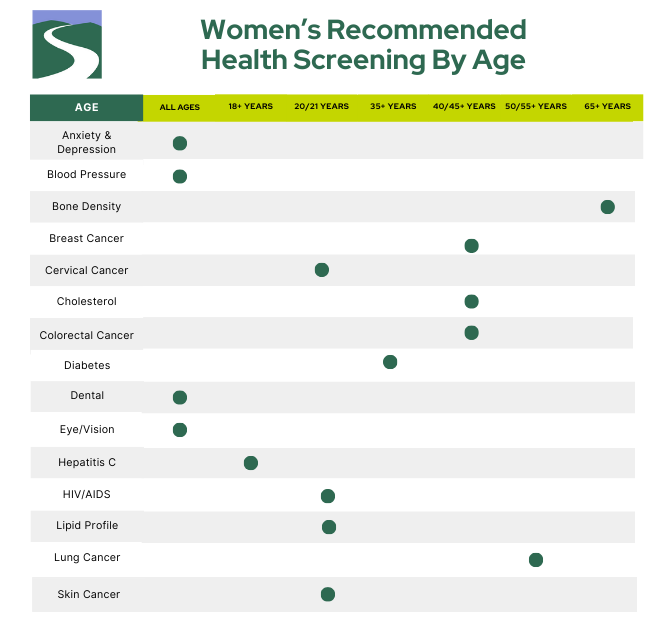May 15, 2024
By the Numbers: Women’s Health Suggested Screenings by Age
Updated May 2025
As a primary care provider, my goal is to help patients stay healthy with a focus on prevention. A big part of that is understanding when and why to recommend health screenings, especially for women.
Health care isn’t one-size-fits-all. Some people may need different tests based on their age, health, or family history. Always talk with your provider about what’s right for you.
Why You Need a Primary Care Provider
Seeing a primary care provider each year helps you catch problems early. Even if you feel fine, a yearly visit helps check your health, look at risks, update vaccinations, and build trust with your provider.
Your provider may ask about:
- Mental health concerns like depression and anxiety
- Food choices and physical activity
- Use of alcohol, tobacco, or drugs
- Safety habits like seat belt use and smoke alarms
- Your medications and possible side effects
- Hearing, vision, and dental issues
- Social determinants of health, including social network, financial resource strain, and domestic violence screening
All conversations are protected by law and kept private under HIPAA rules.
Local and National Data on Women’s Screenings
Screenings save lives. According to the Centers for Disease Control and Prevention (CDC), more than half of deaths from breast, cervical, and colon cancers could be avoided with regular screening tests.
“Talk to your doctor now about when and how often you should be screened before you develop symptoms,” said Dr. Lisa Richardson, director of the CDC Division of Cancer Prevention and Control.
Regular screening tests may find breast, cervical, and colon cancers early when treatment is likely to work best,” agrees Dr. Laura Makaroff, senior vice president of Prevention and Early Detection at the American Cancer Society.
In New Hampshire, breast cancer is the most common cancer in women. Colorectal cancer rates are also higher than the national average, according to the New Hampshire Department of Health and Human Services. That makes regular screenings even more important for our local community.

Women’s Health Screening by Age
Regular screenings help prevent serious illness and keep you healthy. Be sure to talk to your provider about which tests are right for you.
Recommended Screenings for Women by Age
Anxiety and Depression
- Age for screening: All women
- Frequency: At least annually
- Reason: Anxiety and depression are unfortunately common at any age. Undiagnosed and untreated, they negatively affect a woman’s daily home, work, and social life and can worsen or lead to other health problems as well. Acknowledgment and treatment, when necessary, of these problems improve the overall quality of life.
Blood Pressure
- Age for Screening: All ages
- Frequency: Every year
- Reason: Detecting hypertension early can help prevent serious complications such as heart disease and stroke.
Bone Density
- Age for Screening: 65 or after, but earlier if deemed necessary by your primary care provider.
- Frequency: At least once
- Reason: Assessing bone health helps in detecting osteoporosis, especially vital for postmenopausal women.
Breast Cancer
- Age for Screening: 40-74
- Frequency: Annually
- Reason: Early detection significantly improves treatment outcomes for breast cancer.
Cervical Cancer
- Age for Screening: Age 21-65
- Frequency: Pap test every three years with options for Pap test and HPV test every five years from age 30.
- Reason: Pap tests help identify precancerous changes in cervical cells, increasing the effectiveness of treatment of cervical cancer.
- With the HPV vaccine now offered to all preteens and any adult up to the age of 46, we see cervical cancer rates decreasing.
Cholesterol screening
- Age for Screening: 45 for women with no known risk factors for coronary heart disease; Age 20 for women with known risk factors for coronary heart disease.
- Frequency: Annually with risk factors, every 5 years without any risk factors.
- Reason: High cholesterol levels may indicate an increased risk for coronary artery disease.
- Risk factors include family history, smoking, obesity, and diabetes.
Colorectal Cancer
- Age for Screening: 45-75
- Frequency: Depends upon risk factors and method chosen- discuss with your primary care provider for personalized recommendations.
- Reason: Screening aids in the early detection and treatment of colorectal cancer, which is highly curable when detected early.
Diabetes
- Age for Screening: If overweight and between 35-70 years old
- Frequency: Every three years, or as advised by your health care provider
- Reason: Early detection of diabetes or prediabetes allows for easier management and reduces the risk of complications.
Dental
- Age for Screening: 2 years+
- Frequency: Twice every year for an exam and cleaning
- Reason: Screening detects tooth and gum issues and oral cancer and may reduce cardiovascular disease risk.
Eyes/Vision
- Age for screening: All women
- Frequency:
- Newborn
- School-age children eye function and alignment screening annually
- Age 40-64 without risk factors should be examined by an ophthalmologist every 2-4 years, or more frequently depending on your doctor’s recommendation
- Women with diabetes need a diabetic eye exam annually
- Reason: Screening detects any vision changes, eye diseases, and systemic health conditions.
Hepatitis C
- Age for Screening: All adults ages 18 to 79 and once each pregnancy
- Frequency: One time
- Reason: Hepatitis C can cause progressive liver fibrosis and cirrhosis but can be cured in 8-12 weeks with treatment.
HIV/AIDS
- Age for Screening: At least once after age 20 or earlier if at high risk
- Frequency: Discuss further testing with your doctor based on risk factors.
- Reason: Early diagnosis enables prompt treatment and prevents transmission.
Lung Cancer
- Age for Screening: 55-80 for people between the ages of 55 and 80 if you have smoked the equivalent of a pack a day for 30 years and currently smoke or have quit within the past 15 years.
- Frequency: Annual testing with low-dose CT scans.
- Reason: Early detection greatly improves treatment outcomes for lung cancer.
Sexually transmitted infections (chlamydia, gonorrhea, syphilis)
- Age for Screening: Starting when sexually active
- Frequency: Yearly through age 24 if you are sexually active or pregnant. After age 25, get tested if you are at increased risk.
- Reason: Early diagnosis enables prompt treatment and prevents transmission.
Skin Cancer
- Age for Screening: Beginning at age 20
- Frequency: Annually
- Reason: Early detection of melanoma and other types of skin cancer increases the effectiveness of treatment.
The Bottom Line
Taking care of your health doesn’t need to be hard. Regular visits with a primary care provider help you stay ahead of problems and can make these visits pretty quick and seamless. They protect you and your family by finding problems early. Stay up to date, ask questions, and make your health a top priority. Your health care goals are my priority.
 Michelle C. Cooney, APRN-FNP, is focused on patient and family-centered care with a particular interest in natural women’s health, having a certificate in fertility education and medical management (FEMM). She is accepting new patients at Family Practice of South Nashua in New Hampshire. Call 603-888-5573 for an appointment.
Michelle C. Cooney, APRN-FNP, is focused on patient and family-centered care with a particular interest in natural women’s health, having a certificate in fertility education and medical management (FEMM). She is accepting new patients at Family Practice of South Nashua in New Hampshire. Call 603-888-5573 for an appointment.
